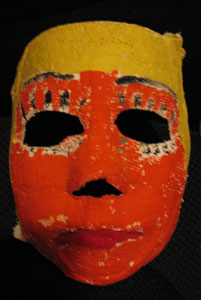
“You must not forget the accent aigu!” instructed Bertrand. “Je vois que vous le faites habituellement.”
He was wearing his usual tormented expression. Had anyone ever told him about it? And what was it that seemed to worry him so?
“Je suis désolée,” Julianne said. “I will try to remember.”
She was paying for these French lessons with her parents’ Christmas present, which every year consisted of the same sized check, and for which, considering the rise in food and gasoline prices, she was grateful. In August, along with two of her fellow teachers, she would be visiting Paris and wanted to refresh her French. It had been twenty-five years since she’d used it. A neighbor who often ate lunch at Café Dakar, an African restaurant near her office, had overheard a waiter speaking French and suggested to Julianne that she check into it. If the man was interested, it could be someone with whom to practice. Julianne had preferred having a native speaker help her, even if not from France, to the stilted and inadequate French teacher at the high school, so after two spicy and delicious meals at the restaurant, she’d made her offer.
“Oh, I am most interested!” Bernard Gbadyu had responded, enthusiasm gleaming in his face, which was distinctly African, rather than African-American. His skin was particularly dark, and his hair, like his speech, had an accent suggesting that it, too, was foreign. And the way he dressed, more fastidious than fashionable, gave the impression of a man who had seldom been anything but serious.
“How much do you charge?” she asked.
They set a price and he was so eager that she understood he must be worried about money. On Thursdays he came over after she got home from school. He seemed grateful when she offered him tea, and delighted when she set out baked goods, though his grave expression would immediately return, even as he bit into a cookie.
During one lesson, she said (in French, of course), “Tell me about your country. What made you come to the United States?”
He seemed uncomfortable. “My country is Cameroon. I came to improve myself,” he said, then paused. “Well, there were other reasons. It was better for me if I left.”
“Your family?” Julianne asked. “Do you have a large one? Surely they must miss you.”
“I am sure that they do, certain of them,” was his enigmatic reply. And he immediately pointed out that she did not truly understand the conditional tense and so they had better practice more of it.
She missed a lesson due to final exams, then only a few days remained till the school year’s end. Over lunch in the teacher’s lounge, Julianne brought up the subject of Cameroon to Karen, who would be going with her to Paris.
“Was there trouble there?” she asked. “You’re a history teacher, so you must know.”
Karen tried to oblige. “African history is not high priority in our curriculum. Maybe it should be. However, I do remember hearing blood was running there, in the early Eighties, I think — that bodies were floating down the rivers. This was after their president, Ahidjo, was forced out. He’d been in office since their independence. Everything is quiet now, I believe, though possibly the current president, just like the old one, is basically a dictator. Why do you ask? Did Bertrand have some kind of trouble?”
“I don’t know,” said Julianne. “I just thought it was odd that he wouldn’t talk about his homeland. Obviously, there’s a story he’s not telling.”
Julianne had been married once, to a Lutheran minister she met shortly after college. He’d attended seminary in the area of the city where she’d worked at the time, when she’d tried her hand at advertising, before settling into teaching. It had been disillusioning to discover that her husband was gay. After that, she’d felt unable to trust her own judgment concerning men, and though she’d had the occasional lover, she’d not met anyone who came close to tempting her into a serious commitment.
“Do you regret it?” her niece once asked her, and she had given the girl an honest answer.
“Yes and no. I sometimes feel that by staying single, I’ve chosen to miss a part of maturation. Having children would be a further step I’ve avoided. But then, as when a blind person is left to develop other senses to a greater degree than usual, maybe staying single is similar? Although I can’t really say what ‘senses’ I would be developing.”
“Maybe you observe others,” suggested her niece. “Like a writer would?”
“Maybe,” Julianne had agreed.
But did she observe others better than most people? A hidden part of her believed that she did. She was a teacher, after all, and teachers had to be observant.

